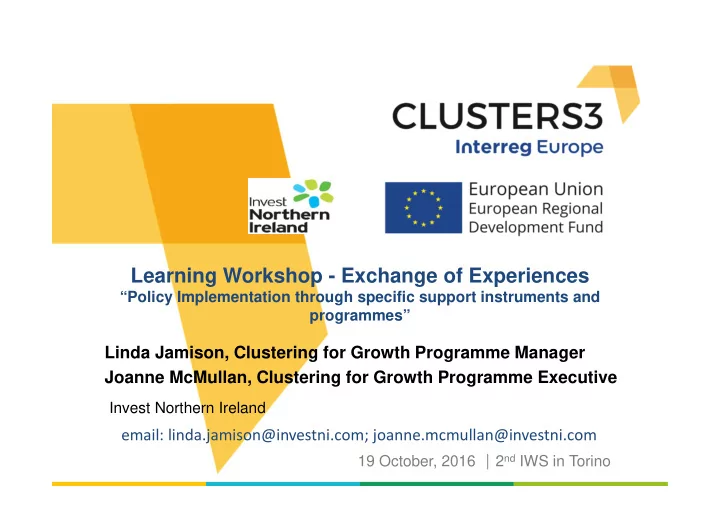

Learning Workshop - Exchange of Experiences “Policy Implementation through specific support instruments and programmes” Linda Jamison, Clustering for Growth Programme Manager Joanne McMullan, Clustering for Growth Programme Executive Invest Northern Ireland email: linda.jamison@investni.com; joanne.mcmullan@investni.com 19 October, 2016 | 2 nd IWS in Torino
Rationale for Cluster Programme • Market failure identified in respect of: • Predominantly SME/micro-SME based economy; high reliance on public sector for employment; • Low levels of innovation amongst NI business; currently least innovation-active region in the UK; • Limited appetite for risk amongst business owners; identified need to encourage cultural shift in attitude to innovation/collaboration • Objectives of the Programme: • Encourage a cultural shift within NI business towards being more proactive and confident in relation to open innovation and risk-taking; • Develop stronger relationships between local businesses and stakeholders to increase knowledge transfer and enhance skills; • Enable companies to leverage the opportunities associated with converging technology and know-how, both within and across sectors; • Equip businesses with the necessary confidence and competence to exploit meaningful international partnerships • Contribute to positioning NI as an example of best practice in relation to Smart Specialisation clusters 2
Beneficiaries • Primary beneficiaries = SMEs based in Northern Ireland; • Larger companies, and those based outside Northern Ireland may also participate; • Academic Institutions and other public sector bodies/stakeholders; • Wider economic/innovation community 3
Technical Assistance Offered • One facilitated workshop per prospective Cluster group, enabling members to scope out project pre-application; • Sign-posting to other sources of funding, both within Invest NI and further afield; • Access to best practice tools in cluster facilitation, business modelling and internationalisation strategies; • Series of masterclasses for Cluster Facilitators; • Opportunity to establish links with other cluster groups funded by Invest NI 4
Financial Assistance Offered • Programme funding = £5.7m over 5 years (drawn from NI block grant via Westminster); • Phase One projects can avail of up to £25k at 100% grant rate * when led by an SME; or up to £25k at 50% grant rate when led by a large company; • Phase Two projects can avail of up to £170k at 100% grant rate when led by an SME; or up to £170k at 50% grant rate when led by a large company; • Pre-payment of a small percentage of Phase One and Phase Two grant can be negotiated in order to assist the Lead Company with set-up costs; * State Aid relief has been sought under GBER Article 27 (Aid for Innovation Clusters) for 50% funded projects, and Article 28 (Innovation Advisory Services) for 100% funded projects 5
Conditions for assistance Groups must: • Consist of a minimum of 4 Northern Ireland businesses, one of whom must be an Invest NI customer to take Letter of Offer, + appropriate membership from academia, public sector, other stakeholders; • Have an SME lead in order to avail of 100% funding; • Seek three quotes for the provision of independent facilitation (Phase One); recruit on open market for Phase Two; • Have a clearly articulated and focused project plan with SMART objectives; • Complete timesheets throughout the duration of the project; • Provide quarterly reporting to Invest NI (Phase 2 only) and a final report at the end of the project (Phase One and Phase Two); • Provide an acceptable audit trail in relation to all eligible invoiced expenditure, evidencing payment of such costs by the lead company in advance of claiming back from Invest NI; 6
Conditions for assistance Projects must: • Meet Invest NI’s intervention principles in order to be approved for funding: � Strategic Fit � Market Failure � Project Risk � Viability � Additionality � Mobility � Economic Efficiency � Cost Effectiveness � Affordability � Value for Money 7
Timescales • Programme is funded for 5 year period (October 2016 – September 2021) • Phase One Scoping Study projects: typically 6 – 9 months, with average 12 month lead time to develop project concept/application • Phase Two fully funded projects: typically 2 – 3 years, with average 6 month lead time to develop application/SMART objectives 8
What’s working well • Opportunity to encourage SMEs to engage in innovation - proven to have a strong positive correlation with profitability, productivity, competitiveness and long-term economic growth • Addresses market failures in respect of low levels of engagement in innovation and collaboration amongst NI businesses; • Offers potential to build capacity and capability of NI businesses by developing human, physical, intellectual, market and social capital; • Acts as an important ‘building block’ in the construction and development of the NI innovation ecosystem; • Acts as one of the cornerstones of designing smart specialisation strategies and as a means of implementing these strategies; • Offers the potential to complement, rather than duplicate, other innovation- orientated interventions that exist on the NI Innovation Escalator; • Positive Return on Investment for Invest NI, as evidenced by recent independent economic evaluation and appraisal 9
Downsides Macro: • No overall cluster policy = limited cross-departmental working on clustering/innovation; • Programme is one of several activities designed to address clustering; not clear how interventions interact with each other; Micro: • Long lead time in getting groups from concept to acceptable application; • Time commitment, particularly from SMEs/micro-SMEs, can be prohibitive; • Can tend to attract same companies participating in multiple projects over period of time; • Perception of undue level of risk on Lead Company; • Quality of project facilitators inconsistent 10
Thank you! Project smedia Questions welcome
Recommend
More recommend